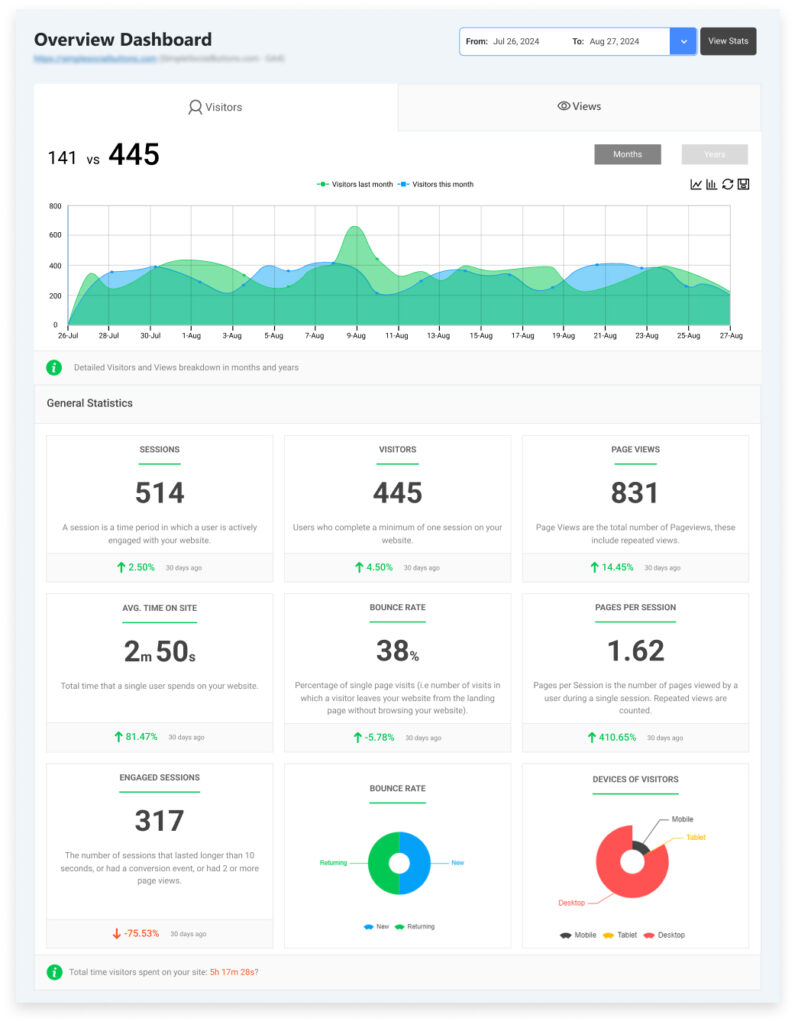
7 Best WordPress CRM Plugins for 2026
Do you know what the best WordPress CRM plugins for 2026 are that can help streamline your business operations?
Customer relationship management has evolved from a “nice-to-have” into a strategic necessity, especially for businesses that rely on WordPress as their digital backbone. In 2026, competition for user attention is tighter, customer expectations are higher, and seamless data management can be the difference between a repeat sale and a lost lead. Yet many WordPress site owners still juggle fragmented contact forms, disjointed analytics, and third-party email tools without a centralized system to tie it all together.
That’s where CRM plugins come in.
For entrepreneurs, marketers, and operations teams using WordPress, choosing the right CRM plugin means automating client communication, tracking lifecycle stages, aligning sales with support, and minimizing manual data entry. Whether you’re a small business scaling up or an agency juggling multiple client accounts, the right CRM plugin can offer measurable gains in efficiency and revenue.
In this article, we’ll talk about the 7 best WordPress CRM plugins for 2026, based on practical use cases, integration options, and growth potential.
Table of Contents
Choosing the Top CRM Plugins for WordPress
Selecting CRM solutions for WordPress in 2026 is no longer about checking boxes for basic features. With customer journeys growing more complex and user data coming from multiple touchpoints, your CRM must act as a unified command center, not just a glorified contact list.
Key Capabilities That Matter
When evaluating plugins, prioritize:
- Native WordPress integration — CRMs should work seamlessly with your existing tech stack, including e-commerce, forms, and email systems.
- Real-time data sync — Ensure the CRM updates lead and customer data dynamically across devices and sessions.
- Scalability — As your business grows, the CRM should support advanced features like workflow automation, lead scoring, and granular segmentation.
Usability & Performance
A powerful CRM is useless if your team avoids using it. Opt for plugins with intuitive dashboards, a minimal learning curve, and support for role-based access. Avoid bloated systems that slow down your WordPress site or complicate simple tasks.
When Off-the-Shelf Isn’t Enough
For businesses with custom processes, niche workflows, or strict data compliance needs, standard plugins may fall short. In these cases, hiring remote CRM developers can provide a tailored solution that aligns with your exact requirements. Whether it’s integrating proprietary systems, building custom reporting modules, or optimizing performance at scale, experienced developers can help extend your CRM beyond the limitations of plugins, without compromising on performance or data integrity.
Choosing the right CRM plugin or custom solution is a decision with long-term impact. In the next section, we’ll explore top-rated WordPress CRM plugins that offer the best mix of features, usability, and adaptability.
Top WordPress CRM Plugins for 2026
In a competitive digital environment, selecting the best CRM for WordPress sites involves finding a solution that strikes a balance between functionality, performance, and adaptability. Below are seven standout CRM plugins for WordPress. Each plugin offers distinct advantages for marketing, sales, and customer retention workflows.
1. FluentCRM
Best for: Email marketing automation inside WordPress
FluentCRM is a self-hosted CRM designed to run entirely within your WordPress dashboard. It enables advanced segmentation, email sequences, and funnel tracking—without relying on third-party SaaS platforms.
Key Features:
- Tag-based contact management
- Visual automation builder
- WooCommerce and LMS integrations
Why it matters in 2026: With increased data privacy regulations, keeping customer data within your own infrastructure (instead of external platforms) gives FluentCRM a significant advantage.
2. WP ERP
Best for: All-in-one business management
WP ERP is a modular plugin that includes CRM, HRM, and accounting tools. It’s ideal for SMEs that want a unified internal management system without juggling multiple platforms.
Key Features:
- Contact grouping and filtering
- Activity logs and notes
- Built-in lead conversion tracking
WP ERP’s flexible architecture allows for both internal and customer-facing workflows, making it a practical choice for distributed teams and hybrid operations.
3. Jetpack CRM
Best for: Freelancers, startups, and agencies
Previously known as Zero BS CRM, Jetpack CRM is lightweight and built specifically for WordPress users who need a no-fuss, efficient system. It integrates well with Stripe, Mailchimp, and PayPal.
Key Features:
- Client portal and invoicing
- Custom fields and contact tags
- Seamless WooCommerce support
Why it’s still strong: Its simplicity and affordability make Jetpack CRM a go-to option for businesses that don’t need enterprise-level features but still demand solid CRM capabilities.
4. Nutshell
Best for: Growing teams seeking an affordable, AI-powered CRM with powerful features
Nutshell is a cloud-based CRM that integrates seamlessly with WordPress through native connectors and web forms. Built for small and mid-sized businesses, Nutshell delivers automation and AI capabilities without the complexity of enterprise software.
Key Features:
- Sales automation and custom pipelines
- AI meeting summaries and email automation
- Web forms, quotes, and invoices
Why it matters: Nutshell’s AI-first approach automates repetitive administrative work, letting teams focus on selling. Combined with affordable pricing and tight WordPress integration, it’s ideal for businesses that have outgrown basic plugins.
5. HubSpot for WordPress
Best for: Teams using HubSpot’s ecosystem
This plugin connects WordPress with the full HubSpot CRM suite, enabling marketers and sales teams to capture leads, track contact interactions, and automate follow-ups—all from within WordPress.
Key Features:
- Integrated forms and popups
- Live chat and chatbot tools
- Email and pipeline automation
Professional advantage: Perfect for teams already embedded in HubSpot’s ecosystem but looking to extend those capabilities into a WordPress-based site or content hub.
6. Groundhogg
Best for: Developers and technical marketers
Groundhogg offers robust marketing automation tools while keeping everything self-hosted on WordPress. It’s modular, developer-friendly, and supports advanced extensions for complex workflows.
Key Features:
- Conditional logic and email sequences
- CRM + LMS integration
- REST API for custom extensions
Its developer-first approach and transparent data ownership make it ideal for regulated industries and technical teams.
7. vCita CRM & Client Management
Best for: Service providers and consultants
vCita offers CRM functionality alongside scheduling, invoicing, and payment tools. It’s particularly effective for solo entrepreneurs or small service teams needing an all-in-one client engagement suite.
Key Features:
- Appointment booking
- Secure client communication portal
- Payment processing and tracking
Why consider it now: With remote work becoming the norm, vCita’s client communication tools can enhance professional image and reduce no-shows.
Key Features:
- Role-based user access
- Lead assignment workflow
- GDPR-ready data structure
Each CRM plugin listed here solves a different business challenge—from marketing automation and workflow integration to client communications and invoicing. In the next section, we’ll wrap up how to match the right plugin with your team’s needs and goals in 2026.
How Analytics Can Enhance Your CRM Data
Join 50,000+ beginners & professionals who use Analytify to simplify their Website Analytics!
While CRM plugins like FluentCRM, WP ERP, and HubSpot help manage customer relationships, integrating analytics tools into your workflow can provide deeper insights into customer behavior and enhance CRM performance.
Analytics tools, such as Analytify, offer valuable data about how users are interacting with your website, which pages they visit, and what actions they take.
By integrating analytics into your CRM system, you can:
1. Track Customer Engagement
Analytics tools can provide detailed insights into customer behavior—what content or products they engage with, how long they spend on certain pages, and where they drop off. This information can be passed to your CRM, allowing for better-targeted communications and personalized follow-ups.
2. Segment Users Based on Behavior
Using analytics, you can segment your customers more effectively. For instance, if analytics shows that a customer has visited a product page several times, you can flag this behavior in your CRM. This allows you to send personalized offers or follow-up emails at the right time, increasing the likelihood of conversion.
3. Automate Customer Interaction Based on Data
Integrating analytics with your CRM can enable automation of customer interactions. For example, if a user abandons their cart, analytics data can trigger automated emails or special offers via your CRM to encourage them to complete their purchase.
4. Analyze Sales Funnels and Optimize Conversions
By tracking user behavior on your website and integrating this data with your CRM, you can identify where customers are getting stuck in the sales funnel. This information helps optimize your marketing strategies and adjust your CRM workflows to close more deals and increase customer retention.
5. Optimize Marketing Campaigns
Analytics also help you understand which marketing campaigns are most effective in driving traffic and generating leads. By integrating this data into your CRM, you can adjust your outreach efforts based on real-time customer interactions and results.
Integrating Analytics with CRM Plugins: What to Look For
When choosing a CRM plugin, ensure that it can integrate seamlessly with analytics tools, whether through native integration or third-party services like Zapier. Look for plugins that allow you to:
- Track website interactions, email engagement, and customer journeys directly within your CRM.
- Automatically update CRM records based on analytics data.
- Create automated workflows that respond to customer behaviors tracked by analytics.
By using analytics with your CRM, you can improve decision-making, enhance customer relationships, and ultimately drive better results from your marketing and sales efforts.
Frequently Asked Questions (FAQs): Best WordPress CRM Plugins
1. What is a WordPress CRM plugin?
A WordPress CRM (Customer Relationship Management) plugin is a tool that integrates directly with your WordPress website to help manage and analyze customer interactions and data. It centralizes customer information, tracks engagement, automates communication, and streamlines sales processes. All within the WordPress dashboard.
2. Why should I use a CRM plugin with my WordPress site?
Integrating a CRM plugin into your WordPress site allows you to:
Centralize customer data for better organization.
Automate marketing and sales workflows.
Track customer interactions and behaviors.
Segment audiences for targeted campaigns.
Enhance customer support and retention.
This integration ensures a seamless experience for both your team and your customers.
3. Which CRM plugin is best for small businesses?
For small businesses, Jetpack CRM and FluentCRM are highly recommended:
Jetpack CRM: Offers a user-friendly interface with features like invoicing, client management, and integrations with WooCommerce.
FluentCRM: Provides advanced email marketing automation, segmentation, and analytics. This is all within the WordPress dashboard.
4. Can I integrate a CRM plugin with my existing tools?
Yes, many WordPress CRM plugins offer integrations with popular tools:
HubSpot CRM: Integrates with email marketing platforms, social media tools, and analytics services.
FluentCRM: Seamlessly integrates with over 30 plugins, including WooCommerce and LearnDash.
These integrations ensure that your CRM works harmoniously with your existing systems.
5. Is there a free CRM plugin for WordPress?
Yes, several CRM plugins offer free versions:
Jetpack CRM: Provides essential CRM features for free, with premium add-ons available.
FluentCRM: Offers a free version with core features, suitable for small businesses.
These free versions are a great starting point for businesses on a budget.
6. How do I choose the right CRM plugin for my business?
Consider the following factors when selecting a CRM plugin:
Business Size and Needs: Smaller businesses may prefer simpler solutions like Jetpack CRM, while larger businesses might require more robust features offered by HubSpot or FluentCRM.
Feature Set: Ensure the plugin offers the features you need, such as automation, segmentation, and analytics.
Integration Capabilities: Check if the CRM integrates with your existing tools and platforms.
Ease of Use: Choose a plugin with an intuitive interface to minimize the learning curve.
Assessing these factors will help you select a CRM plugin that aligns with your business objectives.
Best WordPress CRM Plugins: Final Thoughts
Choosing the right WordPress CRM plugin in 2026 is less about trend-chasing and more about aligning technology with your company’s maturity and operational needs.
For early-stage startups, simplicity and cost-efficiency are often the top priorities. CRM solutions like Jetpack CRM or FluentCRM provide solid functionality without overwhelming setup requirements. Mid-size businesses focused on workflow automation and cross-functional visibility will benefit from the modular flexibility of WP ERP or Groundhogg. For established enterprises that require deep integrations with marketing and sales ecosystems, leveraging platforms like HubSpot’s WordPress plugin ensures continuity and scalability.
Regardless of your company’s size, the key is to select a CRM that complements your internal capabilities, integrates with existing tools, and minimizes long-term friction. A bloated CRM that doesn’t align with your team’s workflow will slow growth, not accelerate it. Matching your CRM plugin to your growth stage allows you to scale with clarity, not complexity.
We hope this article helped you choose the best WordPress CRM plugins.
You may also like to read:
Now we’d like to hear from you. Which solution did you find as the best CRM for WordPress websites? Share with us in the comments below.












